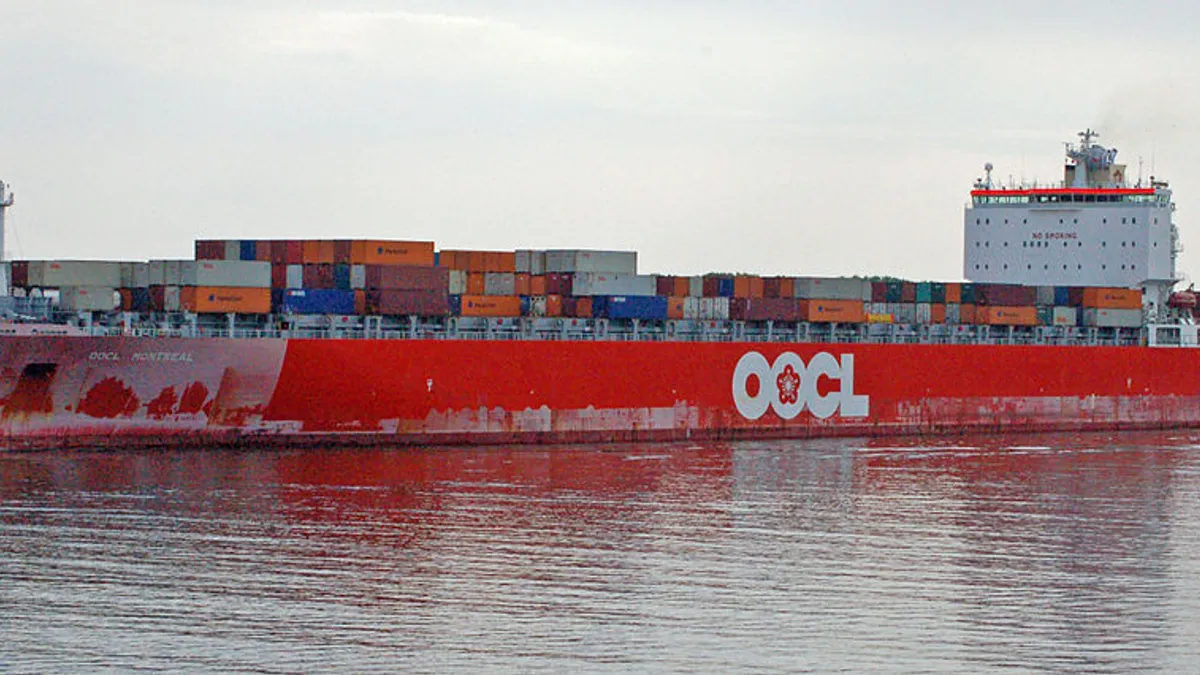Dive Brief:
- The world may soon have a new third-largest ocean carrier, as China's COSCO Shipping announced it would purchase a majority stake in Orient Overseas Container Lines' (OOCL) parent company, pending regulatory approvals in China, the U.S. and the European Union.
- In a Monday filing with the Hong Kong Stock Exchange, COSCO officially offered to buy 90.1% of Orient Overseas International Limited (OOIL) shares, while the Shanghai Port Group would buy the remaining 9.9% of shares at a 37.8% premium for a total sum of approximately HK$49,231.2 million ($6.3 billion).
- The new company would control 11.6% of global container capacity, although OOCL will continue to operate as an independent brand, JOC.com reports. The JOC.com also notes the deal helps COSCO leapfrog to become the second-largest carrier to and from the U.S.
Dive Insight:
The weekend announcement of the deal confirmed one of the poorest-kept secrets of the shipping industry, once more setting in motion the gears of shipping industry consolidation worldwide.
COSCO's purchase of OOCL is not just another deal, however. Various reports have highlighted a string of poetic undertones to the acquisition, as political interests aligned with market trends and global ambitions to bring the deal to fruition.
"Cosco hasn’t hidden its ambition to become one of the world’s dominant carriers," writes The Wall Street Journal's Costas Paris and Joanne Chiu. Splash 24/7 reports the shipping line intends to eventually overcome Maersk Line as the world's largest container line. With OOCL, COSCO becomes an Asian powerhouse on par with the European-based carriers that long-dominated the industry's top three slots. Next up, the website writes, is a potential takeover of CMA CGM.
In fact, the OOCL takeover is but the latest chapter of an industry-wide consolidation that, as American Shipper notes, ironically began with COSCO Container Lines' state-sponsored merger with China Shipping. Back then, China pushed the two to merge in order to gain market share. Politics were not absent in this deal either, according to The Wall Street Journal.
Sounds like China Shipping / COSCO deal all over again!
— Edwin Lopez (@EdwinLopezT37) July 9, 2017
Beyond political and business ambitions however, the deal may well symbolize the beginning of a wider shift in the shipping industry, away from a shippers' market and into a carriers' market. If all pending deals are approved in the next year, by July 2018, 68% of world container capacity will be moved by just six ocean carriers.
Top 6 ocean carriers by capacity, if all proposed deals are approved
| Rank | Company | Capacity (TEUs) | Market Share |
|---|---|---|---|
| 1 | A.P. Moller-Maersk | 3,444,025 | 16.4% |
| 2 | Mediterranean Shipping Co. | 3,081,196 | 14.7% |
| 3 | COSCO Shipping | 2,421,501 | 11.6% |
| 4 | CMA CGM | 2,359,493 | 11.2% |
| 5 | Hapag-Lloyd | 1,516,825 | 7.2% |
| 6 | Ocean Network Express | 1,436,502 | 6.9% |
| Total | 14,234,571 | 68% |
SOURCE: Alphaliner TOP 100, retrieved 7/9/2017
This, in turn, may help inflate rates for shippers and return the industry to profitability. Maersk Line, for example, projects a $1 billion rise in profits by the end of this year. Such conditions likely helped inflate the asking price for the takeover, as OOCL's owners may expect the deal to be accretive to earnings.
Whether political motivations, global business ambitions or basic economic conditions fueled the deal, COSCO's purchase of OOCL highlights the new transport market shippers will face in the near future, as carriers complete their wave of consolidations.














